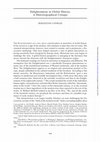Journal articles by Sebastian Conrad

Warum die Vergangenheitsdebatte gerade explodiert Geschichte lebt wieder in Deutschland, ist präs... more Warum die Vergangenheitsdebatte gerade explodiert Geschichte lebt wieder in Deutschland, ist präsent im öffentlichen Raum wie lange nicht mehr. Konflikte und polemische Debatten überall: das Humboldt-Forum und koloniale Beutekunst; die Umbenennung der M-Straße; einhundertfünfzig Jahre Deutsches Kaiserreich; Achille Mbembe, Holocaust und Kolonialismus, die Deutschen mit »Nazihintergrund« und nicht zu vergessen die Machenschaften der Hohenzollern. So unterschiedlich die Debatten im Einzelnen sind, immer wird dabei die Deutung der NS-Zeit oder des Kolonialismus mitverhandelt; häufiger sogar beides. Kein Tag, an dem das Feuilleton nicht bebt, die Twitter-Sphäre ohnehin. Die Dinge, um die es geht, liegen alle lange zurück, sehr lange; manche waren beinahe vergessen. Jetzt sind die Diskussionen gleichwohl so heftig, als ginge es um alles. Warum regen sich gerade alle so auf? In dem gegenwärtigen Kampf um die historische Deutungshoheit mangelt es nicht an Kommentaren, Einlassungen, Deutungen. Aber meist geht es dabei um normative Fragen: Soll koloniale Kunst zurückgegeben, Immanuel Kant aus den Lehrplänen verbannt, sollen Straßen umbenannt werden? Sollte die deutsche Gesellschaft auf der Einzigartigkeit des Holocaust bestehen, oder gibt es eine Verantwortung für die Opfer des Kolonialismus? Diese normativen Fragen-was sollen wir tun?-sind wichtig; sie werden die Feuilleton-Öffentlichkeit noch auf absehbare Zeit beschäftigen. Bislang wird jedoch viel zu wenig thematisiert, worin die Gründe für die aktuelle Aufmerksamkeitsexplosion bestehen. Warum jetzt? Was sagt es über die Gegenwart, wenn die Geschichte wieder zum Gegenstand einer erbitterten, häufig polemischen Auseinandersetzung wird? Was wir im Kern beobachten, sind die Effekte der Ablösung eines Erinnerungsregimes durch ein anderes: Das historische Narrativ der Nachkriegszeit (Erinnerung I) wird durch einen veränderten Erfahrungshaushalt in der globalisierten Gegenwart herausgefordert oder zumindest ergänzt (Erinnerung II). Die Erinnerungsdebatte ist dabei nur die Oberfläche, unter der grundlegende gesellschaftliche Veränderungen liegen, die keineswegs auf Deutschland beschränkt bleiben.
In the late nineteenth century, bodybuilding was seen as a new way of shaping a manly, muscular, ... more In the late nineteenth century, bodybuilding was seen as a new way of shaping a manly, muscular, and beautiful body. Eugen Sandow, sometimes hailed as the "father of modern bodybuilding," emerged as a global icon. Historians have usually understood his travels around the world as the origin of bodybuilding's global career. This article argues, by contrast, that the crossborder trajectory of the ideal and practice of the muscular male body was not the simple result of the diffusion of Western norms, but rather the effect of a global conjuncture. At the turn of the twentieth century, the uneven process of global integration generated debates at the interplay of masculinity, strength, beauty, health, and nationalism and helped establish a new body regime that was employed as a response to the challenges of the modern world in many places.
Colonizing the Nineteenth Century: Implications of a Paradigm Shift, 2018
This is my contribution to a forum of Central European History on the relevance and future prospe... more This is my contribution to a forum of Central European History on the relevance and future prospects of the nineteenth century as a research field.

When European clocks first arrived in seventeenth-century Japan they generated a commotion. The h... more When European clocks first arrived in seventeenth-century Japan they generated a commotion. The highly complex but also very precise instruments had been brought to Nagasaki by the Dutch East India Company that monopolized the sparse and highly regulated trade between Japan and Europe for more than two centuries. As an expression of the technological sophistication achieved in early modern Europe, mechanical clocks were hi-tech products of their time. They operated with a spring to store the energy, and their making required highly developed skills in casting and metalwork. The new technology made it possible to emancipate the measurement of time from sunshine and to achieve an evenness of temporal rhythms, not only during the day, but also at night. In Japan, these European products met with high demand, even if, just as in Europe, they remained a luxury good. Only the feudal lords (daimyô) could afford them. They became known as daimyô tokei, ruler clocks, and served primarily as objects of prestige. And yet, even when the clocks survived the long journey fully intact and undamaged, they were put to markedly different use than their designers had intended. Tokugawa Japan followed a flexible time system: day and night were equally divided into six-hour units. An " hour " corresponded to one-sixth of the daytime—with the day beginning at sunrise (the Hour of the Rabbit) and ending at sunset (the Hour of the Rooster). As such, the actual length of the individual units of time varied with the time of the year (ranging between a hundred and 158 minutes), resulting in the daylight " hours " being significantly longer in summer than in winter.
AcknowLedgements: This article has benefited from discussions at three workshops on Regionalism i... more AcknowLedgements: This article has benefited from discussions at three workshops on Regionalism in East and Southeast Asia, held at the Freie

THE ENLIGHTENMENT HAS LONG HELD a pivotal place in narratives of world history. It has served as ... more THE ENLIGHTENMENT HAS LONG HELD a pivotal place in narratives of world history. It has served as a sign of the modern, and continues to play that role yet today. The standard interpretations, however, have tended to assume, and to perpetuate, a Eu-rocentric mythology. They have helped entrench a view of global interactions as having essentially been energized by Europe alone. Historians have now begun to challenge this view. A global history perspective is emerging in the literature that moves beyond the obsession with the Enlightenment's European origins. The dominant readings are based on narratives of uniqueness and diffusion. The assumption that the Enlightenment was a specifically European phenomenon remains one of the foundational premises of Western modernity, and of the modern West. The Enlightenment appears as an original and autonomous product of Eu-rope, deeply embedded in the cultural traditions of the Occident. According to this master narrative, the Renaissance, humanism, and the Reformation " gave a new impetus to intellectual and scientific development that, a little more than three and a half centuries later, flowered in the scientific revolution and then in the Enlightenment of the eighteenth century. " 1 The results included the world of the individual, human rights, rationalization, and what Max Weber famously called the " disenchant-ment of the world. " 2 Over the course of the nineteenth century, or so the received wisdom has it, these ingredients of the modern were then exported to the rest of the world. As William McNeill exulted in his Rise of the West, " We, and all the world of the twentieth century, are peculiarly the creatures and heirs of a handful of geniuses of early modern Europe. " 3 This interpretation is no longer tenable. Scholars are now challenging the Eu-rocentric account of the " birth of the modern world. " Such a rereading implies three

Geschichte und Gesellschaft, 2011
Mit dem Namen Cecil Rhodes konnte einer Umfrage im Jahre 1996 zufolge in Großbritannien kaum jema... more Mit dem Namen Cecil Rhodes konnte einer Umfrage im Jahre 1996 zufolge in Großbritannien kaum jemand mehr etwas anfangen -mit Cecil Rhodes, der treibenden Kraft hinter der britischen Expansion in Afrika, dem Namensgeber des Staates Rhodesien, dem Symbol des Empire. Die Mehrzahl der Befragten verwechselte ihn mit einem Fernsehkoch namens Rhodes, überdies mit einem Vornamen -Gary -, der kaum geeignet war, imperiale Assoziationen auszulösen. Aber diese Verwechslung trug insofern symbolische Züge, als sie illustrierte, dass das Empire inzwischen auch zuhause angekommen war : Erst im Zuge der postkolonialen Migration brachten die ehemaligen Kolonisierten ihre geschmacklichen Vorlieben und kulinarischen Kompetenzen mit in die Metropole und machten aus der britischen Küche, diesem ewigen Spott Europas, eine ernstzunehmende cuisine. Auch wenn also in der kollektiven Erinnerung für die Geschichte des Empire kein Platz mehr zu sein schien, hatten das Kolonialreich und seine Auflösung doch auch in Großbritannien ihre Spuren hinterlassen. 1 Der Prozess der Dekolonisation nach 1945 gehört zu den zentralen Ereignissen der Nachkriegszeit. Er beendete in weiten Teilen der Welt die formale koloniale Herrschaft, die in einigen Regionen, etwa in Indien, beinahe 200 Jahre Bestand gehabt hatte. Die Dekolonisation veränderte die Weltkarte und sie hat die Gesellschaften der ehemaligen Kolonien grundlegend transformiert. Angesichts des langen Bestehens der kolonialen Imperien ist anzunehmen, dass ihre Auflösung auch an den europäischen Gesellschaften nicht spurlos vorübergegangen ist. Aber lange Zeit kam der Frage nach den Auswirkungen der Dekolonisation in der Forschung zur europäischen Nachkriegsgeschichte keine große Bedeutung zu. Selbst in den Ländern mit langer kolonialer Vergangenheit, und ungeachtet der häufig gewaltsamen Konflikte um Zeitpunkt und Modalitäten der Ablösung, war das öffentliche und wissenschaftliche Interesse an diesem Prozess gering.

The trajectories of German nationalism in the late nineteenth century were deeply affected by the... more The trajectories of German nationalism in the late nineteenth century were deeply affected by the process of globalization. While the literature on the subject has largely remained within the confines of a national history paradigm, this article uses the example of mobility and migration to show to what extent German nationalism was transformed under the auspices of global integration. Among the effects of cross-border circulation were the emergence of diasporic nationalism, the racialization of the nation, the implementation of new border regimes, and the hegemony of ideological templates that articulated nationalist discourse through global geopolitics. This article is intended as a contribution to a 'spatial turn' in the historiography of nationalism, in arguing that not only the 'nation form' but also the way that the nation was defined, understood, and practised – the particular contents of nationalism – owed more to the global context in which it was constituted than is usually recognized.
JSTOR is a not-for-profit service that helps scholars, researchers, and students discover, use, a... more JSTOR is a not-for-profit service that helps scholars, researchers, and students discover, use, and build upon a wide range of content in a trusted digital archive. We use information technology and tools to increase productivity and facilitate new forms of scholarship. For more information about JSTOR, please contact support@jstor.org. . Germany and Japan, 1945-2001 In the history of memory, the national paradigm continues to reign supreme. This may come as a surprise at a time when the historical profession is beginning to discard the category of the nation and starting to produce transnational work. International comparisons and relational histories, and also the larger frameworks of European, post-colonial, or world history gradually seem to be replacing the narrow confines of the nineteenth-century paradigm of national history.
Books by Sebastian Conrad
... CONTENTS Introduction 1 1. Mapping Postwar Historiography in Germany and Japan 14 2. The Orig... more ... CONTENTS Introduction 1 1. Mapping Postwar Historiography in Germany and Japan 14 2. The Origin of the Nation: Bismarck, Meiji Ishin, and the Subject of History 31 3. The Nation as Victim: Writing the History of National Socialism and Japanese Fascism 78 4. The Invention ...
Reviews by Sebastian Conrad
The Journal of Asian Studies, 2001
... Textbook controversies reveal one important way that societies negotiate, institutionalize, a... more ... Textbook controversies reveal one important way that societies negotiate, institutionalize, and renegotiate nationalist ... Some American edu-cators also have drawn a variety of critical lessons from ... countries the vision of education as a tool of democratic citizenship has coexisted ...
Book chapters by Sebastian Conrad










Uploads
Journal articles by Sebastian Conrad
Books by Sebastian Conrad
Reviews by Sebastian Conrad
Book chapters by Sebastian Conrad